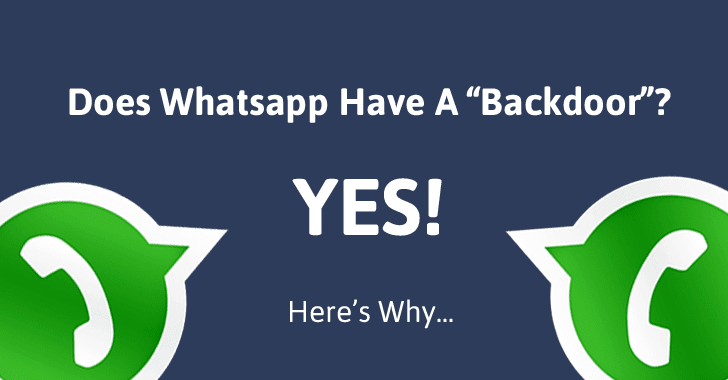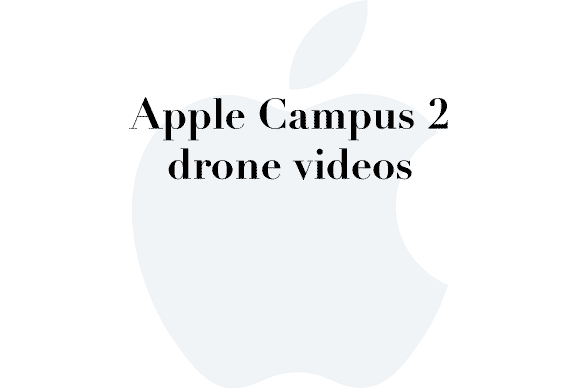Explained — What's Up With the WhatsApp 'Backdoor' Story? Feature or Bug!
 What is a backdoor?
What is a backdoor?
By definition: «Backdoor is a feature or defect of a computer system that allows surreptitious unauthorized access to data,» either the backdoor is in encryption algorithm, a server or in an implementation.
Yesterday, we published a story based on findings reported by security researcher Tobias Boelter that suggests WhatsApp has a backdoor that «could allow» an attacker, and of course the company itself, to intercept your encrypted communication.
The story involving the world’s largest secure messaging platform that has over a billion users worldwide gone viral in few hours, attracting reactions from security experts, WhatsApp team, and Open Whisper Systems, who partnered with Facebook to implement end-to-end encryption in WhatsApp.
Note: I would request readers to read complete article before reaching out for a conclusion. And also, suggestions and opinions are always invited 🙂
What’s the Issue:
The vulnerability relies on the way WhatsApp behaves when an end user’s encryption key changes.
WhatsApp, by default, trusts new encryption key broadcasted by a contact and uses it to re-encrypt undelivered messages and send them without informing the sender of the change.
In my previous article, I have elaborated this vulnerability with an easy example, so you can head on to read that article for better understanding.
Facebook itself admitted to this WhatsApp issue reported by Boelter, saying that » we were previously aware of the issue and might change it in the future, but for now it’s not something we’re actively working on changing. »
What Experts argued:
According to some security experts — «It’s not a backdoor, rather it’s a feature to avoid unnecessarily re-verification of encryption keys upon automatic regeneration. »
Open Whisper Systems says — «There is no WhatsApp backdoor,» «it is how cryptography works,» and the MITM attack «is endemic to public key cryptography, not just WhatsApp. »
A spokesperson from WhatsApp, acquired by Facebook in 2014 for $16 Billion, says — «The Guardian’s story on an alleged backdoor in WhatsApp is false. WhatsApp does not give governments a backdoor into its systems. WhatsApp would fight any government request to create a backdoor. »
What’s the fact:
Notably, none of the security experts or the company has denied the fact that, if required, WhatsApp, on government request, or state-sponsored hackers can intercept your chats.
What all they have to say is — WhatsApp is designed to be simple, and users should not lose access to messages sent to them when their encryption key is changed.
Open Whisper Systems (OWS) criticized the Guardian reporting in a blog post saying, «Even though we are the creators of the encryption protocol supposedly «backdoored» by WhatsApp, we were not asked for comment. »
What? «…encryption protocol supposedly «backdoored» by WhatsApp…» NO!
No one has said it’s an «encryption backdoor;» instead this backdoor resides in the way how end-to-end encryption has been implemented by WhatsApp, which eventually allows interception of messages without breaking the encryption.
As I mentioned in my previous story, this backdoor has nothing to do with the security of Signal encryption protocol created by Open Whisper Systems. It’s one of the most secure encryption protocols if implemented correctly.
Then Why Signal is more Secure than WhatsApp?
You might be wondering why Signal private messenger is more secure than Whatsapp, while both use the same end-to-end encryption protocol, and even recommended by the same group of security experts who are arguing — «WhatsApp has no backdoor. »
It’s because there is always room for improvement.
The signal messaging app, by default, allows a sender to verify a new key before using it. Whereas, WhatsApp, by default, automatically trusts the new key of the recipient with no notification to the sender.
And even if the sender has turned on the security notifications, the app notifies the sender of the change only after the message is delivered.
So, here WhatsApp chose usability over security and privacy.
It’s not about ‘Do We Trust WhatsApp/Facebook?’:
WhatsApp says it does not give governments a «backdoor» into its systems.
No doubt, the company would definitely fight the government if it receives any such court orders and currently, is doing its best to protect the privacy of its one-billion-plus users.
But what about state-sponsored hackers? Because, technically, there is no such ‘reserved’ backdoor that only the company can access.
Why ‘Verifying Keys’ Feature Can’t Protect You?
WhatsApp also offers a third security layer using which you can verify the keys of other users with whom you are communicating, either by scanning a QR code or by comparing a 60-digit number.
But here’s the catch:
This feature ensure that no one is intercepting your messages or calls at the time you are verifying the keys, but it does not ensure that no one, in the past had intercepted or in future will intercept your encrypted communication, and there is no way, currently, that would help you identify this.
WhatsApp Prevention against such MITM Attacks are Incomplete
WhatsApp is already offering a «security notifications» feature that notifies users whenever a contact’s security code changes, which you need to turn on manually from app settings.
But this feature is not enough to protect your communication without the use of another ultimate tool, which is — Common Sense .
Have you received a notification indicating that your contact’s security code has changed?
Instead of offering ‘Security by Design,’ WhatsApp wants its users to use their common sense not to communicate with the contact whose security key has been changed recently, without verifying the key manually.
The fact that WhatsApp automatically changes your security key so frequently (for some reasons) that one would start ignoring such notifications, making it practically impossible for users to actively looking each time for verifying the authenticity of session keys.
What WhatsApp should do?
Without panicking all one-billion-plus users, WhatsApp can, at least:
Stop regenerating users’ encryption keys so frequently (I clearly don’t know why the company does so). Give an option in the settings for privacy-conscious people, which if turned on, would not automatically trust new encryption key and send messages until manually accepted or verified by users.
…because just like others, I also hate using two apps for communicating with my friends and work colleagues i.e. Signal for privacy and WhatsApp because everyone uses it.
© Source: http://feedproxy.google.com/~r/TheHackersNews/~3/l2HP8JPOjQE/whatsapp-backdoor-encryption.html
All rights are reserved and belongs to a source media.


 Your personal brand isn’t just a buzz phrase. It’s the unique combination of skills, experience, passion and personality that makes you exactly the right fit for your dream job. Building a personal brand means going beyond simply regurgitating your resume across multiple platforms, says Gianna Scorsone, vice president of marketing and sales operations at IT staffing and recruiting firm Mondo.
Your personal brand isn’t just a buzz phrase. It’s the unique combination of skills, experience, passion and personality that makes you exactly the right fit for your dream job. Building a personal brand means going beyond simply regurgitating your resume across multiple platforms, says Gianna Scorsone, vice president of marketing and sales operations at IT staffing and recruiting firm Mondo. 
 It’s not an exaggeration to say that your smartphone is the most personal device you have. The fact it’s always with you, however, sure does generate a lot of information about your habits.
It’s not an exaggeration to say that your smartphone is the most personal device you have. The fact it’s always with you, however, sure does generate a lot of information about your habits.
 The Apple-related headlines were slow to roll out at the beginning of this year, but going into the second week of 2017, the news picked up. Check out the important Apple headlines from the past week in this slideshow. Just click on the link to get more information.
The Apple-related headlines were slow to roll out at the beginning of this year, but going into the second week of 2017, the news picked up. Check out the important Apple headlines from the past week in this slideshow. Just click on the link to get more information. 
 In this century, there’s too much competitions among tech firms around the world. Tech-companies coming up with innovative ideas every single day, enhancing their product; smartphones, laptops, gaming console, and forth, to the fullest. This brings or accumulates the companies customer base, and having more customers is all what that matters.
In this century, there’s too much competitions among tech firms around the world. Tech-companies coming up with innovative ideas every single day, enhancing their product; smartphones, laptops, gaming console, and forth, to the fullest. This brings or accumulates the companies customer base, and having more customers is all what that matters. 
 大学入試センター試験が14日、全国691会場で始まり、本格的な受験シーズンがスタートした。厳しい寒波に見舞われた日本列島は広い範囲で大雪が降り、各地で交通が混乱。同センターによると、8会場(午後5時時点)で試験開始時刻を繰り下げる措置が取られ、約2000人に影響した。 開始時刻が繰り下げられた試験場はいずれも新潟県で、新潟経営大(加茂市)▽長岡技術科学大(長岡市)▽日本歯科大新潟生命歯学部(新潟市)-の3会場で60分遅らせた。新潟大(同)▽新潟青陵大(同)▽新潟国際情報大本校(同)▽岐阜大(岐阜市)▽福島大(福島市)-の5会場では、計249人について30~125分繰り下げる措置がとられた。 また、新潟大▽新潟県立看護大(新潟県上越市)▽新潟医療福祉大(新潟市)▽新潟国際情報大本校-の4会場では、計74人が再試験の対象となった。 日程は2日間。センター試験を利用する大学と短大は計848校で、志願者数は57万5967人(対前年度比2・2%増)となった。初日は地理歴史・公民、国語、外国語が行われた。2日目の15日は理科と数学。
大学入試センター試験が14日、全国691会場で始まり、本格的な受験シーズンがスタートした。厳しい寒波に見舞われた日本列島は広い範囲で大雪が降り、各地で交通が混乱。同センターによると、8会場(午後5時時点)で試験開始時刻を繰り下げる措置が取られ、約2000人に影響した。 開始時刻が繰り下げられた試験場はいずれも新潟県で、新潟経営大(加茂市)▽長岡技術科学大(長岡市)▽日本歯科大新潟生命歯学部(新潟市)-の3会場で60分遅らせた。新潟大(同)▽新潟青陵大(同)▽新潟国際情報大本校(同)▽岐阜大(岐阜市)▽福島大(福島市)-の5会場では、計249人について30~125分繰り下げる措置がとられた。 また、新潟大▽新潟県立看護大(新潟県上越市)▽新潟医療福祉大(新潟市)▽新潟国際情報大本校-の4会場では、計74人が再試験の対象となった。 日程は2日間。センター試験を利用する大学と短大は計848校で、志願者数は57万5967人(対前年度比2・2%増)となった。初日は地理歴史・公民、国語、外国語が行われた。2日目の15日は理科と数学。
 岐阜県は14日、同県山県市の養鶏場で同日、鶏100羽以上が死んでいるのが見つかり、簡易検査で計6羽からA型鳥インフルエンザウイルスの陽性反応が出たと発表した。遺伝子検査も陽性が確定し、この養鶏場で飼育する約8万羽を殺処分するなどの対応をとると決めた。 県によると、養鶏場が同日朝、大量死に気づいて県に通報した。死んだのはいずれも、敷地内に八つあるうちの一つの鶏舎で飼う生後45日前後の個体。簡易検査では死んだ5羽と生きている1羽から鳥インフルエンザの陽性反応が出た。県は出荷停止を依頼し、鶏舎を消毒した。 県は、この養鶏場から半径3キロ以内にある山県市内の養鶏場4戸(計約7万8千羽飼育)にも鶏や卵などの出荷自粛を要請。同3~10キロ以内で、岐阜市と関市を含めた3市にある12戸の養鶏場には、この範囲外への出荷制限を求めた。 遺伝子検査で陽性と判断されれば、県は24時間以内に殺処分を終えることを目指し、自衛隊に災害派遣要請をして協力を求める予定。陽性であれば、岐阜県内の養鶏場では初めてで、県は毒性の強い高病原性かどうかの検査を国の機関に依頼する。 県は同10キロ以内の池などを野鳥の監視重点区域とし、環境省や範囲内の7市町と連携して異状のある野鳥がいないか監視にあたる。(山岸玲)
岐阜県は14日、同県山県市の養鶏場で同日、鶏100羽以上が死んでいるのが見つかり、簡易検査で計6羽からA型鳥インフルエンザウイルスの陽性反応が出たと発表した。遺伝子検査も陽性が確定し、この養鶏場で飼育する約8万羽を殺処分するなどの対応をとると決めた。 県によると、養鶏場が同日朝、大量死に気づいて県に通報した。死んだのはいずれも、敷地内に八つあるうちの一つの鶏舎で飼う生後45日前後の個体。簡易検査では死んだ5羽と生きている1羽から鳥インフルエンザの陽性反応が出た。県は出荷停止を依頼し、鶏舎を消毒した。 県は、この養鶏場から半径3キロ以内にある山県市内の養鶏場4戸(計約7万8千羽飼育)にも鶏や卵などの出荷自粛を要請。同3~10キロ以内で、岐阜市と関市を含めた3市にある12戸の養鶏場には、この範囲外への出荷制限を求めた。 遺伝子検査で陽性と判断されれば、県は24時間以内に殺処分を終えることを目指し、自衛隊に災害派遣要請をして協力を求める予定。陽性であれば、岐阜県内の養鶏場では初めてで、県は毒性の強い高病原性かどうかの検査を国の機関に依頼する。 県は同10キロ以内の池などを野鳥の監視重点区域とし、環境省や範囲内の7市町と連携して異状のある野鳥がいないか監視にあたる。(山岸玲)
 14日の大学入試センター試験では、日本史Aの問題に人気アニメ「妖怪ウォッチ」のキャラクターが登場した。 妖怪ウォッチの「ロボニャン」「ムダヅカイ」と、漫画家の水木しげるさんが描いた「新ぬりかべ」「新ぬらりひょん」の四つの妖怪の説明をイラストとともに掲載。それぞれの妖怪が生まれたとされる時期の出来事を説明した四つの文章のうち、正しい組み合わせを選ばせる問題だった。 過去にも2014年の日本史AとBで、手塚治虫さんの漫画を題材にした戦時中に関する出題があった。
14日の大学入試センター試験では、日本史Aの問題に人気アニメ「妖怪ウォッチ」のキャラクターが登場した。 妖怪ウォッチの「ロボニャン」「ムダヅカイ」と、漫画家の水木しげるさんが描いた「新ぬりかべ」「新ぬらりひょん」の四つの妖怪の説明をイラストとともに掲載。それぞれの妖怪が生まれたとされる時期の出来事を説明した四つの文章のうち、正しい組み合わせを選ばせる問題だった。 過去にも2014年の日本史AとBで、手塚治虫さんの漫画を題材にした戦時中に関する出題があった。
 安倍晋三首相は14日、オーストラリアのターンブル首相とシドニーの首相公邸で会談し、トランプ米次期政権発足後も日米豪の強固な連携をめざすことを確認した。両首脳は、自衛隊と豪軍の間で弾薬提供を可能にする「物品役務相互提供協定(ACSA)」改定の署名にも立ち会った。環太平洋経済連携協定(TPP)の早期発効をめざすことでも一致した。
安倍晋三首相は14日、オーストラリアのターンブル首相とシドニーの首相公邸で会談し、トランプ米次期政権発足後も日米豪の強固な連携をめざすことを確認した。両首脳は、自衛隊と豪軍の間で弾薬提供を可能にする「物品役務相互提供協定(ACSA)」改定の署名にも立ち会った。環太平洋経済連携協定(TPP)の早期発効をめざすことでも一致した。 
 東京都は14日、築地市場(中央区)からの移転時期の判断材料となる、豊洲市場(江東区)の地下水の最終調査結果を公表した。環境基準の最大79倍のベンゼンが検出されたほか、検出されないことが環境基準のシアンも出た。結果を受け、小池百合子知事は記者団に「想定を超える数値が出て驚いている。厳しい結果だ。専門家会議の議論を参考にしたい」と述べるにとどまったが、移転時期をめぐる判断に影響を与えそうだ。
東京都は14日、築地市場(中央区)からの移転時期の判断材料となる、豊洲市場(江東区)の地下水の最終調査結果を公表した。環境基準の最大79倍のベンゼンが検出されたほか、検出されないことが環境基準のシアンも出た。結果を受け、小池百合子知事は記者団に「想定を超える数値が出て驚いている。厳しい結果だ。専門家会議の議論を参考にしたい」と述べるにとどまったが、移転時期をめぐる判断に影響を与えそうだ。 

